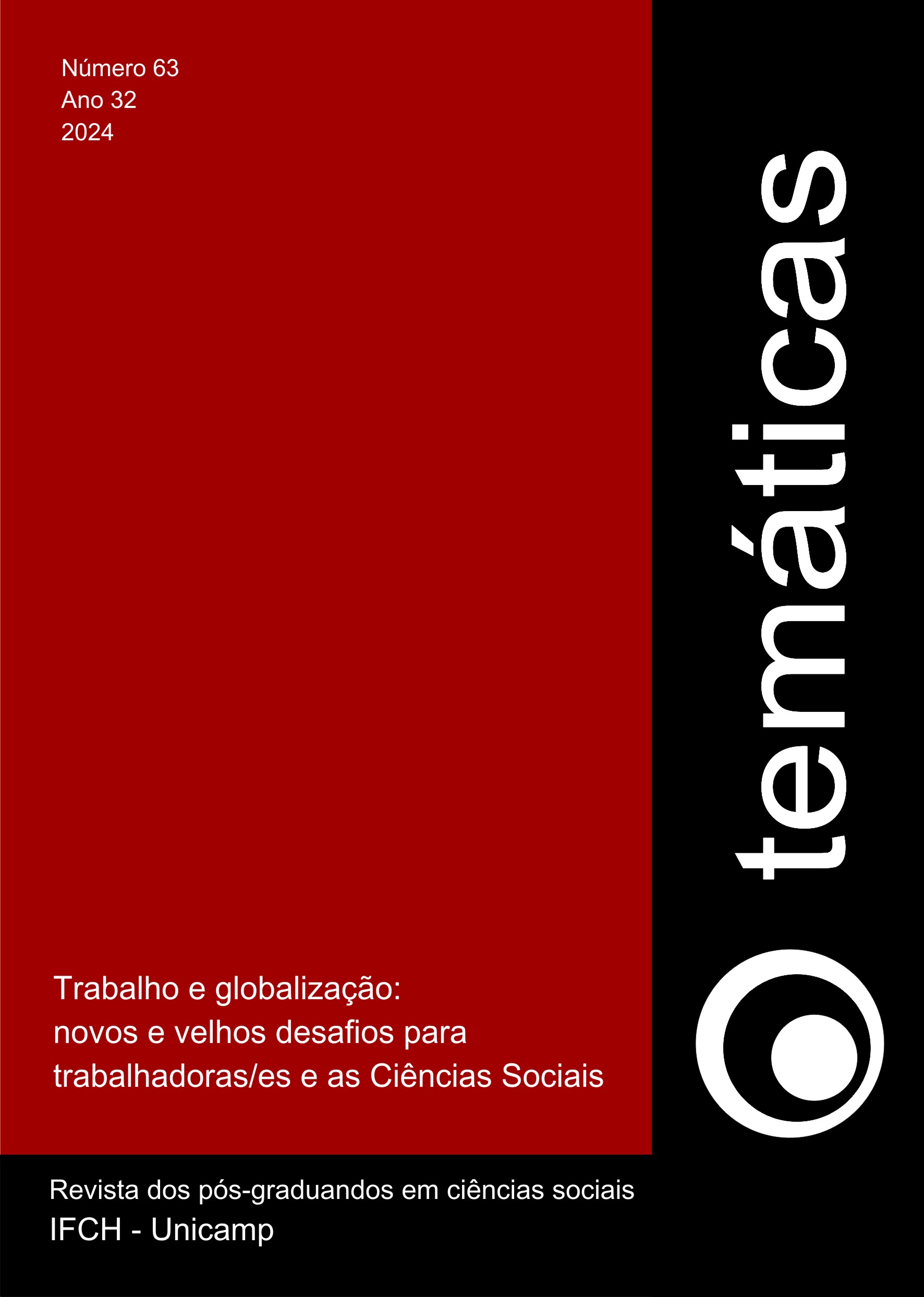Abstract
This paper seeks to contribute to discussions about transformations in the labor market and the international division of production based on the case study of the automotive industry in Brazil. The research was carried out using a quantitative method of analyzing official data on the Brazilian labor market from the RAIS database, covering the period between 2006 and 2020. This data was analyzed using official categories of types of occupation and economic activity, segregating assemblers and auto parts suppliers. As a result, it was identified that, in 2020, Brazil had almost half a million formal jobs in the automotive industry, with 63.5% of these jobs in occupations directly linked to production and only 5.6% of “science and arts professionals”. The calculation of an occupational concentration quotient shows that assemblers concentrate proportionally more jobs related to research and development (R&D) than supplier firms. It is argued that the results reinforce the perception that Brazil occupies an intermediate position in the global automotive production network, being mainly responsible for production activities. At the same time, the study reinforces the hypothesis that the need to adapt products to regional markets puts pressure on transnational companies (TNC) to decentralize part of their R&D processes, transferring knowledge to subsidiaries and local companies.
References
ADĂSCĂLIȚEI, Dragoș; GUGA, Ștefan. Tensions in the periphery: Dependence and the trajectory of a low-cost productive model in the Central and Eastern European automotive industry. European Urban and Regional Studies, v. 27, n. 1, p. 18–34, 2020.
AMATUCCI, Marcos; BERNARDES, Roberto. Formação de competências para o desenvolvimento de produtos em subsidiárias brasileiras de montadoras de veículos. Produção: uma publicação da Associação Brasileira de Engenharia de Produção, v. 19, n. 2, p. 359–375, 2009.
BRASIL, Ministério do Trabalho e Emprego. Classificação Brasileira de Ocupações. 3a ed. Brasília: MTE, SPPE, 2010a. v. 1.
BRASIL, Ministério do Trabalho e Emprego. Classificação Brasileira de Ocupações. 3a ed. Brasília: MTE, SPPE, 2010b. v. 2.
BURAWOY, Michael. A transformação dos regimes fabris no capitalismo avançado. Revista Brasileira de Ciências Sociais, v. 13, p. 29–50, 1990.
CASTELLS, Manuel. A Sociedade em Rede. São Paulo: Paz e Terra, 1999. v. I.
DARDOT, Pierre; LAVAL, Christian. A nova razão do mundo: ensaio sobre a sociedade neoliberal. São Paulo: Boitempo, 2016.
DE MASI, Domenico. A sociedade pós-industrial. 3. ed. São Paulo: Editora SENAC São Paulo, p. 11–9, 2000.
DICKEN, Peter. Mudança Global. Porto Alegre: Bookman, 2010.
FRIGANT, Vincent; ZUMPE, Martin. Redes Globales de Producción: ¿cada vez más globales? Una comparación de los procesos de integración global y regional basada en datos sobre el intercambio comercial de autopartes. In: PANIGO, DEMIAN et al. (Org.). La encrucijada del autopartismo en América Latina. Buenos Aires: APEL, 2017.
GORZ, André. O imaterial: conhecimento, valor e capital. São Paulo: Annablume, 2005.
HARVEY, David. O novo imperialismo. São Paulo: Loyola, 2009.
HENDERSON, Jeffrey et al. Redes de produção globais e a análise do desenvolvimento econômico. Revista Pós Ciências Sociais, v. 8, n. 15, p. 143–170, 2011.
IBGE, Instituto Brasileiro de Geografia e Estatística. Classificação Brasileira de Ocupações: CBO. Disponível em: https://concla.ibge.gov.br/classificacoes/por-tema/ocupacao/classificacao-brasileira-de-ocupacoes.html. Acesso em: 13 nov. 2021.
KRZYWDZINSKI, Martin. Automation, digitalization, and changes in occupational structures in the automobile industry in Germany, Japan, and the United States: a brief history from the early 1990s until 2018. Industrial and Corporate Change, v. 30, n. 3, p. 499–535, 2021.
LANDRY, Charles. Cidade Criativa: A história de um conceito. In: REIS, Ana Carla; KAGEYAMA, Peter (Org.). Cidades Criativas: Perspectivas. São Paulo: Garimpo de Soluções, 2011.
LIMA, Raphael Jonathas da Costa; DULCI, João Assis. Trabalhando sem a Ford: política industrial e ação corporativa em São Bernardo do Campo. Revista Brasileira de Ciências Sociais, v. 36, n. 107, p. e3610709, 2021.
MARTINS, M.B.; KAMINSKI, P.C. Differences in open innovation practices between headquarters and subsidiaries in the automotive industry: The French case. Cogent Engineering, v. 6, n. 1, 2019.
MARX, Karl. O Capital: crítica da economia política. 2. ed. São Paulo: Nova Cultural, 1986, v. 1.
NEGRI, Antonio; HARDT, Michael. Império. São Paulo: Record, 2001.
NEGRI, Antonio; LAZZARATO, Maurizio. Trabalho Imaterial: formas de vida e produção de subjetividade. Rio de Janeiro: DP&A, 2001.
PAIVA, Carlos Águedo. Desenvolvimento regional, especialização e suas medidas. Indicadores Econômicos FEE, v. 34, p. 89–102, 2006.
PAVLÍNEK, P. Global Production Networks, Foreign Direct Investment, and Supplier Linkages in the Integrated Peripheries of the Automotive Industry. Economic Geography, v. 94, n. 2, p. 141–165, 2018.
RAMALHO, José Ricardo; SANTANA, Marcos Aurélio. Sociologia do trabalho no mundo contemporâneo. Rio de Janeiro: Zahar, 2004.
SASSEN, Saskia. Sociology of globalization. 1 ed. New York: W.W. Norton, 2007.
VAN TUIJL, Erwin et al. Multinational Knowledge Strategies, Policy and the Upgrading Process of Regions: Revisiting the Automotive Industry in Ostrava and Shanghai. European planning studies, v. 20, n. 10, p. 1627–1646, 2012.
WATSON, Audrey. Measuring occupational concentration by industry. Disponível em: https://www.bls.gov/opub/btn/volume-3/measuring-occupational-concentration-by-industry.htm?view_full. Acesso em: 02 mar. 2022.
WILLMOTT, H. Creating “value” beyond the point of production: branding, financialization and market capitalization. Organization, v. 17, n. 5, p. 517–542, 2010.
ZHAO, Z.; ANAND, J.; MITCHELL, W. A dual networks perspective on inter-organizational transfer of R&D capabilities: International joint ventures in the Chinese automotive industry. Journal of Management Studies, v. 42, n. 1, p. 127–160, 2005.

This work is licensed under a Creative Commons Attribution-NonCommercial-ShareAlike 4.0 International License.
Copyright (c) 2024 Diego Moreira Maggi


